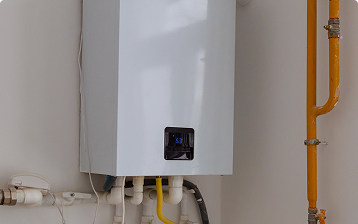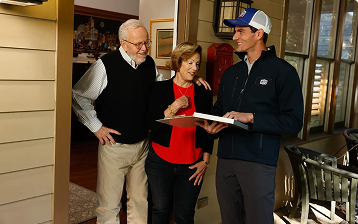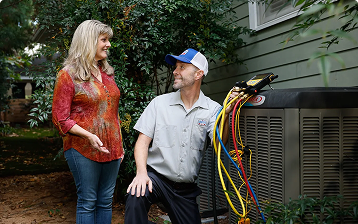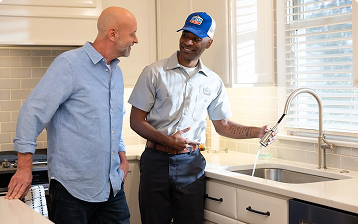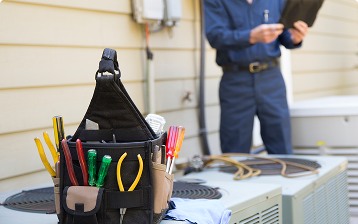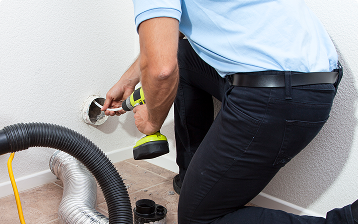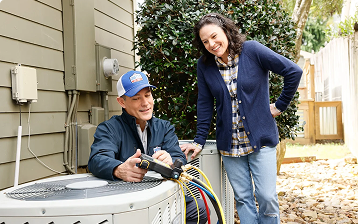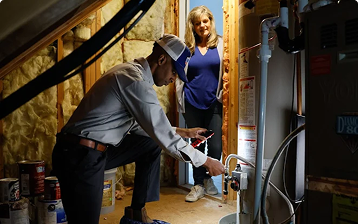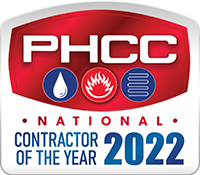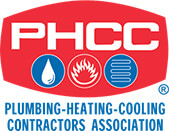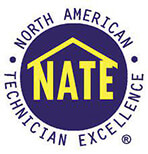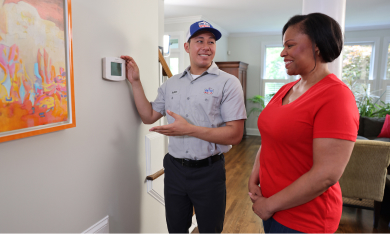
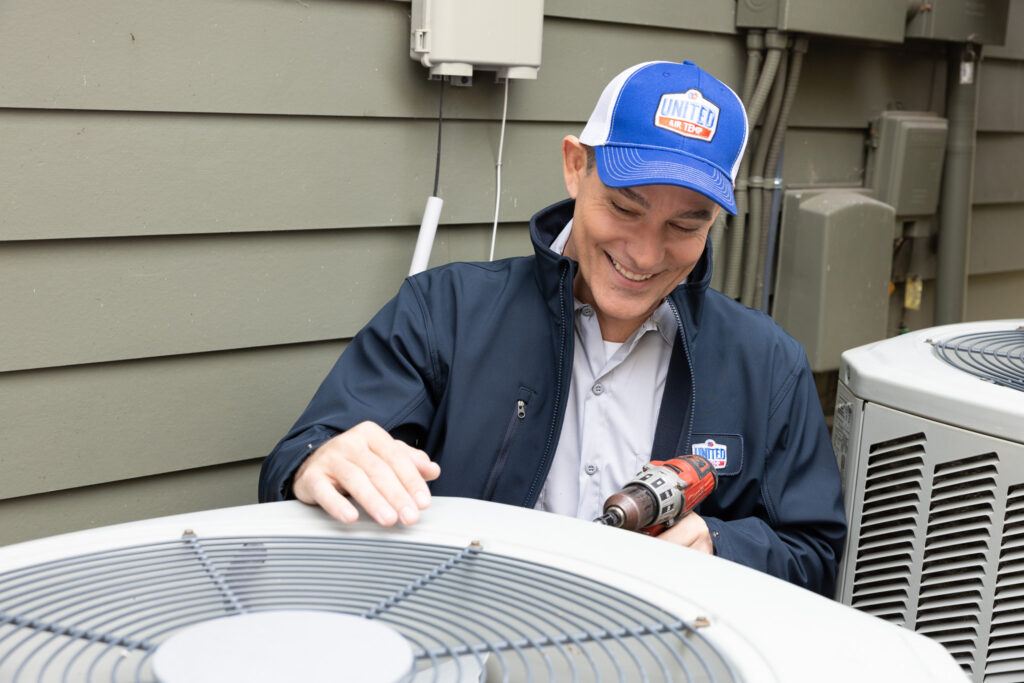
Air conditioning: most homeowners take it for granted—until it stops performing at its best.
Understanding how your home’s AC works and recognizing signs of wear can help you make confident, informed decisions about whether to repair or replace your unit.
Whether you’re curious about maintenance tips, DIY troubleshooting, or average cooling costs in the U.S., having the right information protects your investment and keeps your home comfortable.
Read on for the top air conditioning FAQs every Atlanta homeowner should know!
How Much Is a New Air Conditioning Unit?
Homeowners can expect to pay between $3,800 and $7,500 for a new residential AC system. Final pricing depends on several factors, including your home’s size, the unit’s efficiency rating (SEER), and the complexity of installation. Higher-SEER models generally cost more upfront but can offer better long-term savings. Remember that additional expenses—like updating ductwork, replacing an outdated thermostat, or covering labor—can affect your total investment too.
How Do I Maintain My Air Conditioning System?
Regular maintenance keeps your AC running efficiently and helps prevent unexpected breakdowns. Start by changing your air filters every 1 to 3 months—more often if you have pets or allergies. Once a year, gently clean your outdoor condenser coils and indoor evaporator coils to remove dirt and debris. Most importantly, schedule a professional tune-up annually—ideally before peak cooling season. A technician can catch minor issues early, improve efficiency, and extend the lifespan of your system.
Can My Air Conditioning Make Me Sick?
Yes, it’s possible—especially if your AC is poorly maintained or infrequently cleaned.
Dirty air filters or neglected components may circulate dust, allergens, or even mold through your home. In some cases, cold, dry air can also irritate the respiratory system, especially for people with allergies or asthma. To reduce health risks, change your filters regularly and schedule routine maintenance. A humidifier or whole-home humidity control can also help balance indoor air and support a healthier environment.
How Long Do Air Conditioning Units Last?
Most central air conditioning units last around 12 to 15 years—sometimes longer with consistent HVAC maintenance. Regular tune-ups, timely filter changes, and clean components can greatly affect system longevity. If your AC is over a decade old and you’re noticing frequent breakdowns, higher energy bills, or uneven cooling, it might be time to consider a replacement.
Why Is My Air Conditioning Unit Leaking Water?
If you notice water pooling around your AC unit, don’t panic—it’s a common issue with several possible causes. A clogged condensate drain line is one of the most frequent culprits, but frozen coils or a dirty air filter can also lead to leaks. While some minor issues can be resolved by replacing the filter or clearing the drain line, leaks can signal a larger problem. Left unchecked, they may cause water damage, mold growth, or even system failure.
How Do You Repair an Air Conditioning Unit?
First, we recommend a few simple checks: ensure your thermostat is set correctly, inspect the air filter for blockages, and confirm that the unit receives power. If those basics look fine, the issue could involve more technical problems like refrigerant leaks, electrical faults, or a faulty capacitor. Before attempting more involved air conditioner troubleshooting, it’s best to consult a licensed HVAC technician to prevent unintended damage.
What Is Ductless Air Conditioning?
Ductless air conditioning, often called mini-split systems, offers a flexible cooling solution without the need for ductwork. These systems consist of an outdoor compressor and one or more indoor air handlers that cool specific rooms or zones in your home. Ductless systems are ideal for houses without existing ducts or for targeting particular areas, and are energy-efficient and easy to install. Plus, they operate quietly and give you greater control over your comfort!
How Does Central Air Conditioning Work?
Central air systems cool your entire home through a coordinated process that involves a few components: the outdoor condenser, indoor evaporator coil, air handler, and duct system. The system uses a refrigerant to transfer heat from inside your home to the outside, lowering indoor temperatures. Your thermostat acts as the control center, signaling when to turn the system on or off to maintain a desired indoor temperature. This whole-home cooling approach is convenient for consistent, year-round control.
What Is a Mini-Split Air Conditioning Unit?
This ductless system consists of an outdoor compressor and one or more indoor air handlers connected by refrigerant lines. Unlike traditional AC, mini-splits don’t require ductwork, making them ideal for room additions, garages, or when you want to cool specific zones in your home. They offer flexible installation and energy-efficient cooling, giving you control over individual rooms without the cost and complexity of extending duct systems.
Can a Nest Thermostat Replace Heating and Air Conditioning Controls?
While a Nest thermostat is compatible with most HVAC systems, checking wiring requirements for your specific installation is important. Nest offers smart features like scheduling, remote access, and energy-saving settings that can help reduce standby energy loss. Many homeowners can handle installation for simpler setups, but professional installation is recommended, especially for dual-fuel systems or more complex HVAC configurations.
How Do I Charge My Home Air Conditioning System?
“Charging” an AC means adding refrigerant, the chemical fluid responsible for heat transfer. Due to safety and environmental regulations, this task requires an EPA-certified technician, so it’s crucial to leave it to a professional.
If your system is low on refrigerant, you might notice warm air coming from the vents, hissing sounds, or iced-up coils. Call a licensed professional to diagnose and recharge your system safely—never resort to DIY methods.
Does Air Conditioning Reduce Humidity?
Yes! Air conditioning systems naturally reduce indoor humidity as they cool your home. When warm air passes over the evaporator coil, moisture condenses and drains away, lowering humidity levels. Be aware that dehumidification depends on properly sizing your AC unit—an undersized or oversized system can struggle to maintain comfortable moisture levels. Adding a whole-house dehumidifier in particularly humid climates like Atlanta can provide extra moisture control.
How Do I Clean My Air Conditioning Coils?
Before you start, always turn off the power to your AC unit. Use a soft coil brush or a commercial coil cleaner designed for evaporator and condenser coils to remove dirt and debris gently. Cleaning your coils once a year helps maintain your system’s efficiency and prevents unnecessary strain. If you’re unsure or uncomfortable with the process, having a professional handle it during an annual AC tune-up is a good idea.
How Much Does Air Conditioning Cost in Electricity?
The cost of running your air conditioner varies based on its efficiency (measured by SEER), how often you use it, and local energy rates. For central AC units, electricity costs typically range from about $0.06 to $0.88 per hour of operation. To help lower your AC unit cost, consider using a smart thermostat for efficient temperature control, running ceiling fans to improve airflow, and keeping up with regular maintenance.
Do You Need Help with Your Air Conditioning System?
If you’re facing AC issues or simply want expert guidance, United Air Temp is here to help. We offer same-day service and 24/7 emergency repairs—because your comfort shouldn’t wait. Our team goes the extra mile for every customer, treating each service call as the start of a lasting relationship. Contact us today for trusted, responsive support you can count on.
Our comprehensive AC services in the Atlanta Metro area include:
- Air conditioning repair
- Air conditioning replacement
- Air conditioning maintenance
- Thermostat installation and repair
- Ductless mini-split services
- And more!
More Info on Air Conditioning
Want to learn more about your home’s AC? Explore our blog posts and expert guides for tips, industry breakthroughs, and maintenance advice:
- Refrigerant Leak Detection During Tune-Ups: How It Prevents Compressor Failure
- How Proper Sizing Saves You Money on a New AC Install
- 2025 Changes to Freon Requirements Explained for Georgia Homeowners
- Frequent AC Short-Cycling: What It Means & How Fast You Should Act
- Can I Use a Humidifier With an Air Conditioner?
- What is a SEER Rating & Why Does It Matter for Your Home?
- Do I Need a New Air Conditioner for Atlanta’s Summer?
- Is It Okay To Replace Just a Furnace But Not the AC in Georgia?
- What Is the Lifespan of an HVAC System in Atlanta?
- Heat Pumps vs. Central AC: Which Is Best for Georgia Homes?
- Are Ductless Mini-Split Air Conditioners Worth It In the South?
- 4 Most Common AC Issues in Southern Homes
We’ve been a leader in home comfort since 1931. Contact a UAT team member now to schedule same-day AC repair for your Atlanta home.




